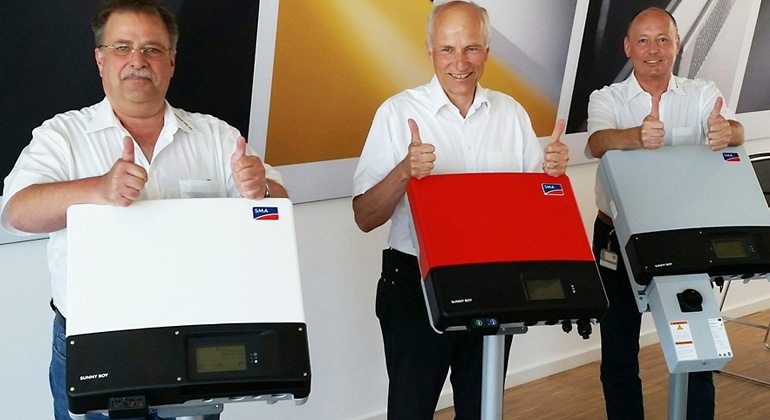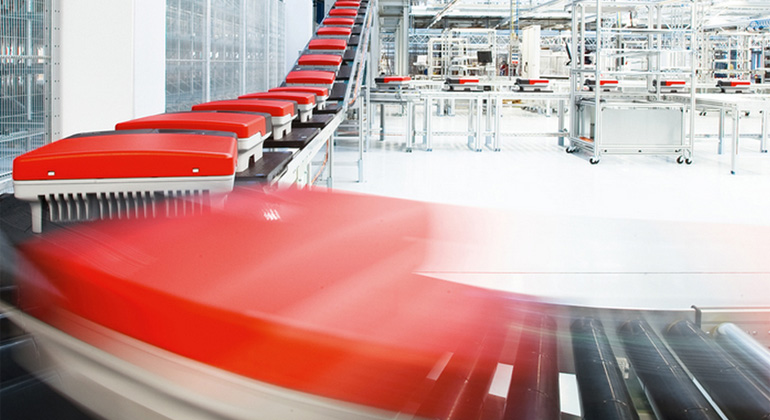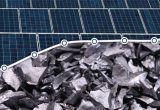Success Story: 1 Million Sunny Boy TL Inverters Sold Worldwide
SMA has been making and selling PV inverters for over 30 years. But no product has been installed as often as the Sunny Boy TL: launched in 2008, the one-millionth unit from this product family was sold in June 2015.
As a result, the Sunny Boy is the bestselling inverter of its class worldwide. Its total installed output – more than four gigawatts – is enough to replace four typical nuclear power plants. The Sunny Boy TL, in other words, is an SMA symbol of the global energy transition. It is mainly used in single-family homes, proving that photovoltaics has beaten all the odds to enter people’s minds and hearts. The Sunny Boy is the global standard for homeowners who want to contribute to the supply of sustainable energy.
In this interview, product managers Wilfried Vogt, Detlev Tschimpke and Klaus Wenig tell the story behind the Sunny Boy, its different areas of application and why it shouldn’t be banished to the basement.
You have been the product managers for the Sunny Boy TL since the start. How does it feel to know that your “baby” has sold 1 million units?
Detlev: Well, the discovery was kind of an accident. We’re not exactly sitting around with a counter in our hand. Our Japanese team wanted the number to show a customer. So we started counting our sales and were astounded to learn that we had hit the one-million mark. We knew that the Sunny Boy was a good seller, but this really brought it home. We are obviously proud of everyone who helped make this happen.
What was your goal for the market launch in 2008?
Detlev: We wanted to launch an innovative, high-quality product for the residential market. The slogan said it all: “Perfection Plus. Usability.” Our main focus was on offering high efficiency, the new Bluetooth communications interface, a graphical display and an attractive design. We wanted to get away from the ugly boxes that were usually hidden in basements and develop a product that owners would be proud to show off. In the end, we won the Intersolar Award for innovation and the iF product design award for the design in 2008. We were clearly off to a good start.
Market conditions have changed considerably, especially in Germany and Europe, since the 2012 Renewable Energy Sources Act (EEG) capped new installed PV capacity and drastically lowered the feed-in tariff. What do you think is the secret of the Sunny Boy’s success despite the challenges?
Wilfried: The Sunny Boy TL is the VW Beetle of solar inverters. It is rugged, good value, extremely high-quality, quick and easy to install, and able to handle a wide variety of applications. An extremely low percent of our devices are returned every year. The Sunny Boy TL is a “set and forget” system. It just keeps running and running and running — like a VW Beetle.
How have the target markets changed?
Wilfried: At the start of 2008, we focused on Germany and Europe because they had good incentive systems. We have since added the US, Japan and Australia as core markets. These are very different markets with unique conditions. Japan, for example, doesn’t have any raw materials for generating power so it fortunately relies heavily on photovoltaics in addition to nuclear power. Most Japanese inverters are installed indoors and have to blend in as much as possible — hence the different cover color. Single-family homes in Japan are traditionally small, so the Sunny Boy 4500TL-JP was the first inverter for outdoor use. Australia is also a steadily growing market. It focuses on “PV zero export”: PV system owners consume all of the power they generate instead of feeding it into the grid. That makes the Sunny Boy TL an attractive choice for all homeowners.
Klaus: The US is another huge market with a market model all its own. Americans are very fond of photovoltaics. The version used in the US and Japanese markets has an integrated back-up power supply unit. This special feature ensures that small household appliances such as refrigerators, electric kettles or cell phone and laptop charging stations continue to be supplied with electricity even if there is a power outage during the day. This innovation has proven very popular in the US and contributed tremendously to the widespread adoption of our product. Also, in most cases, electric utility companies in the US install the PV systems on their customers’ properties in exchange for lower electricity rates. That way, the utility company does not need to invest in grid infrastructure. Germany has plenty of untapped potential in this regard, too. We can learn a lot from the US. If we produced electricity at the point of consumption — i.e. on the roofs of our homes and businesses — we wouldn’t have to worry about sinking billions in grid upgrades.
What challenges will the Sunny Boy have to meet in the future? Where can it improve?
Wilfried: It has to lose a little weight and communicate using state-of-the-art methods. Those are the defining issues.
It’s got a definite personality… If you were a Sunny Boy, what would you want for yourselves?
Wilfried: I would definitely not want to be stuck in a basement. I’m made for outdoor use, but am generally tucked away in a basement. That’s a waste — no one can really see me. Except in Japan, of course, but that’s due to space constraints since single-family homes are much smaller in that market. Inverters are hung up outdoors in the US, too, due to the leasing system.
Detlev: I would want to see every corner of the Earth and work everywhere in order to supply clean, green energy.
Klaus: I would want to keep generating power for self-consumption and grid feed-in at many single-family homes in the US and beyond — and help families get through the difficulties caused by power outages.









